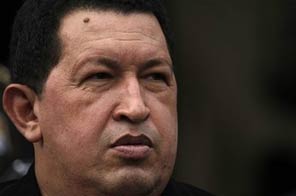Venezuela orders envoy back
CARACAS: President Hugo Chavez announced the return of his ambassador to Colombia, but said Venezuela still intends to take a stand against negotiations to lease seven Colombian military bases to the U.S.
Tensions between the neighboring nations have also soared over Colombia's statement that the anti-tank weapons in the hands of leftist rebels came from Venezuela.
Chavez told Ambassador Gustavo Marquez on Saturday to return to Bogota, 11 days after the diplomat was recalled. He also reiterated concerns that the U.S. could use bases in Colombia to destabilize the region.
"We're not telling Colombia what it has to do with its territory," said Chavez in an interview from Caracas with Colombia's RCN television. "But we have the right to make warnings, and that's what we're doing."
Colombian officials have said Venezuela has no reason to be concerned, and that the U.S. forces would help fight drug trafficking.
Chavez previously accused Colombia — one of its largest trading partners of acting irresponsibly in its accusation that anti-tank rocket launchers sold to Venezuela by Sweden during the 1980s were obtained by the Revolutionary Armed Forces of Colombia, or FARC. Sweden confirmed the weapons were originally sold to Venezuela's military.
Chavez assured a group of visiting Colombian activists that he is willing to work with Colombia to settle the diplomatic dispute.
The group was headed by Sen. Piedad Cordoba and Alan Jara, a politician and former FARC hostage. On Thursday, Colombian President Ernesto Samper visited Venezuela in an attempt to improve relations.
Cordoba, a close Chavez ally, told reporters that the meeting's success offered "a very important message" to the FARC regarding the need for dialogue with the Colombian government.
President Alvaro Uribe's government said late Friday that only the nation's president and foreign minister are authorized to act regarding foreign relations.
Michael Shifter of the Washington-based Inter-American Dialogue think tank said Chavez is likely looking to safeguard Venezuela's economic ties. Chavez had threatened to halt $7.2 billion in shared annual trade and expropriate Colombian businesses if further accusations were made.
"Whatever the tension and mistrust between the two governments, they're very intertwined in their economic relations," Shifter said. "It makes it very difficult to cut off all relationships with Colombia — it's just not realistic."
Relations between Venezuela and Colombia previously reached a low point last year, after Colombia attacked a FARC camp in Ecuador. Chavez responded by temporarily pulling his ambassador from Bogota and briefly dispatching troops to the 1,400-mile (2,300-kilometer) border with Colombia. Chavez and Uribe later made amends.
Colombian officials have long alleged that Chavez's government aids the FARC by giving senior rebel leaders refuge and allowing the guerrillas to smuggle tons of cocaine through the country — allegations that Chavez denies.






